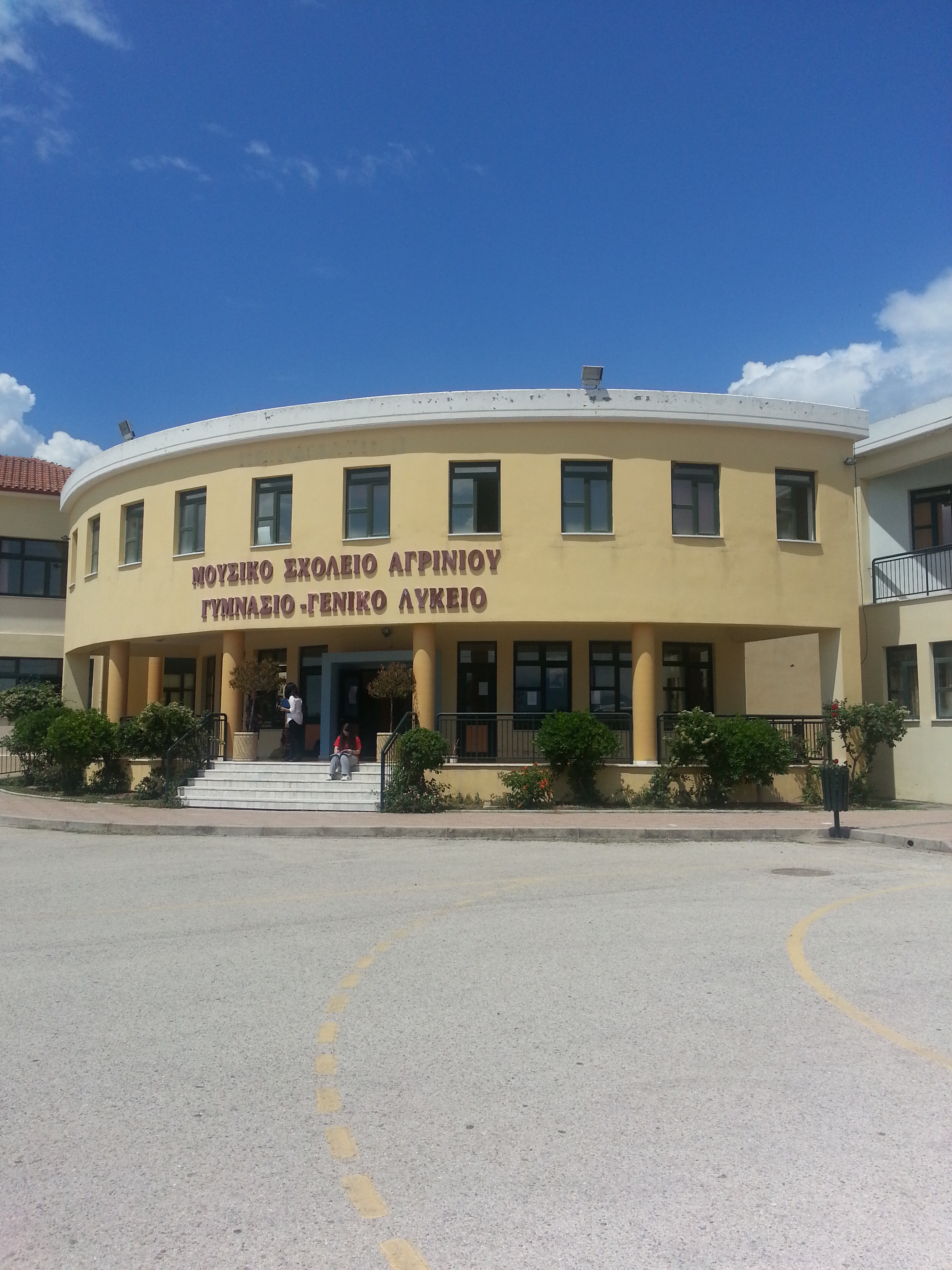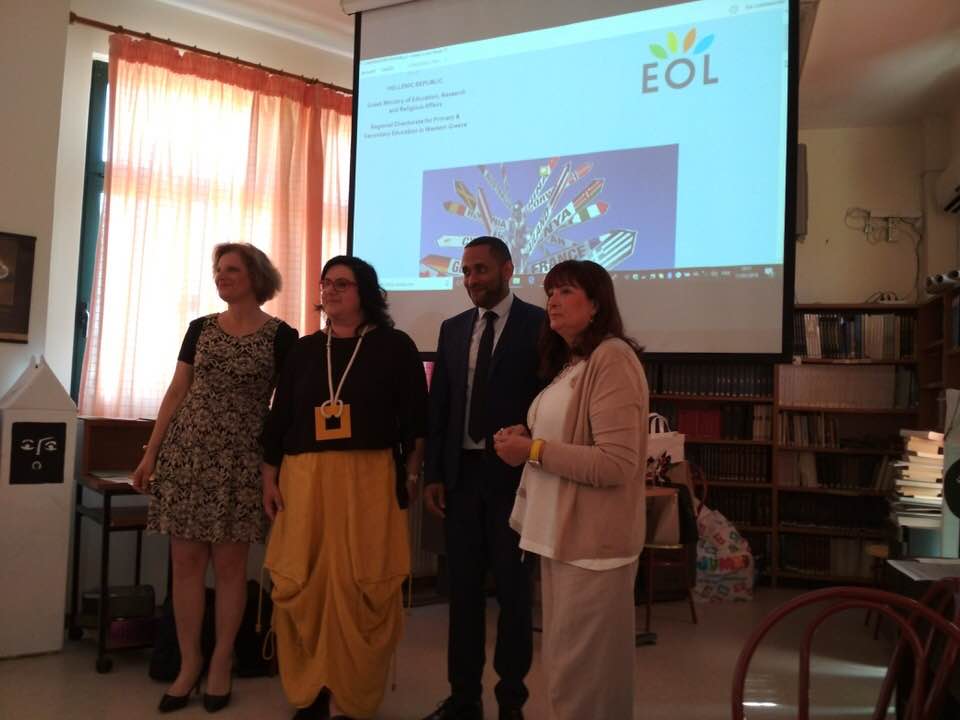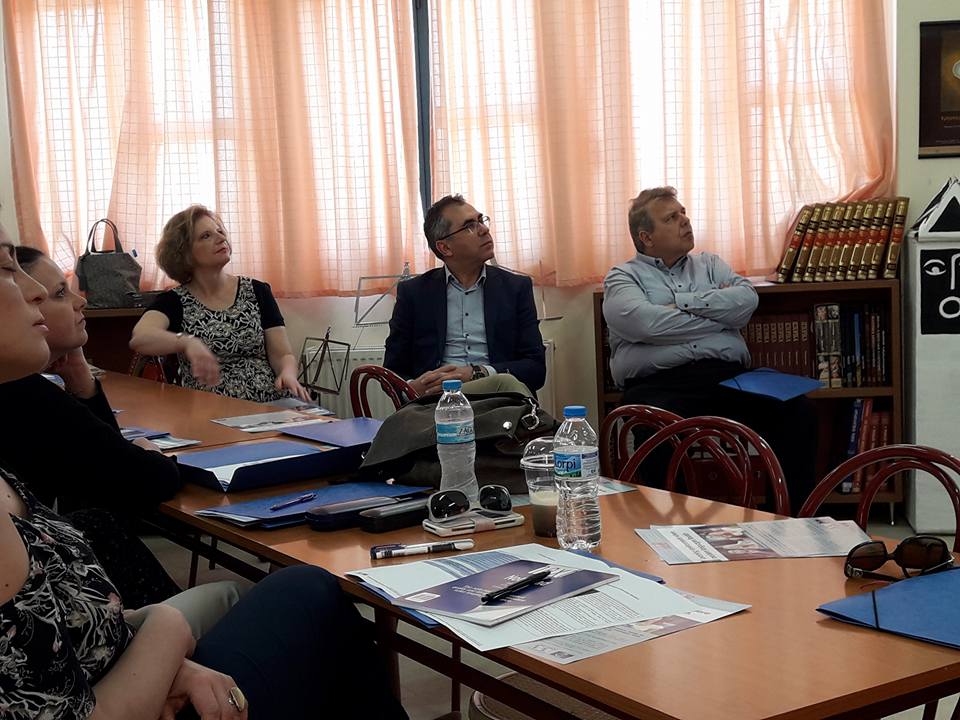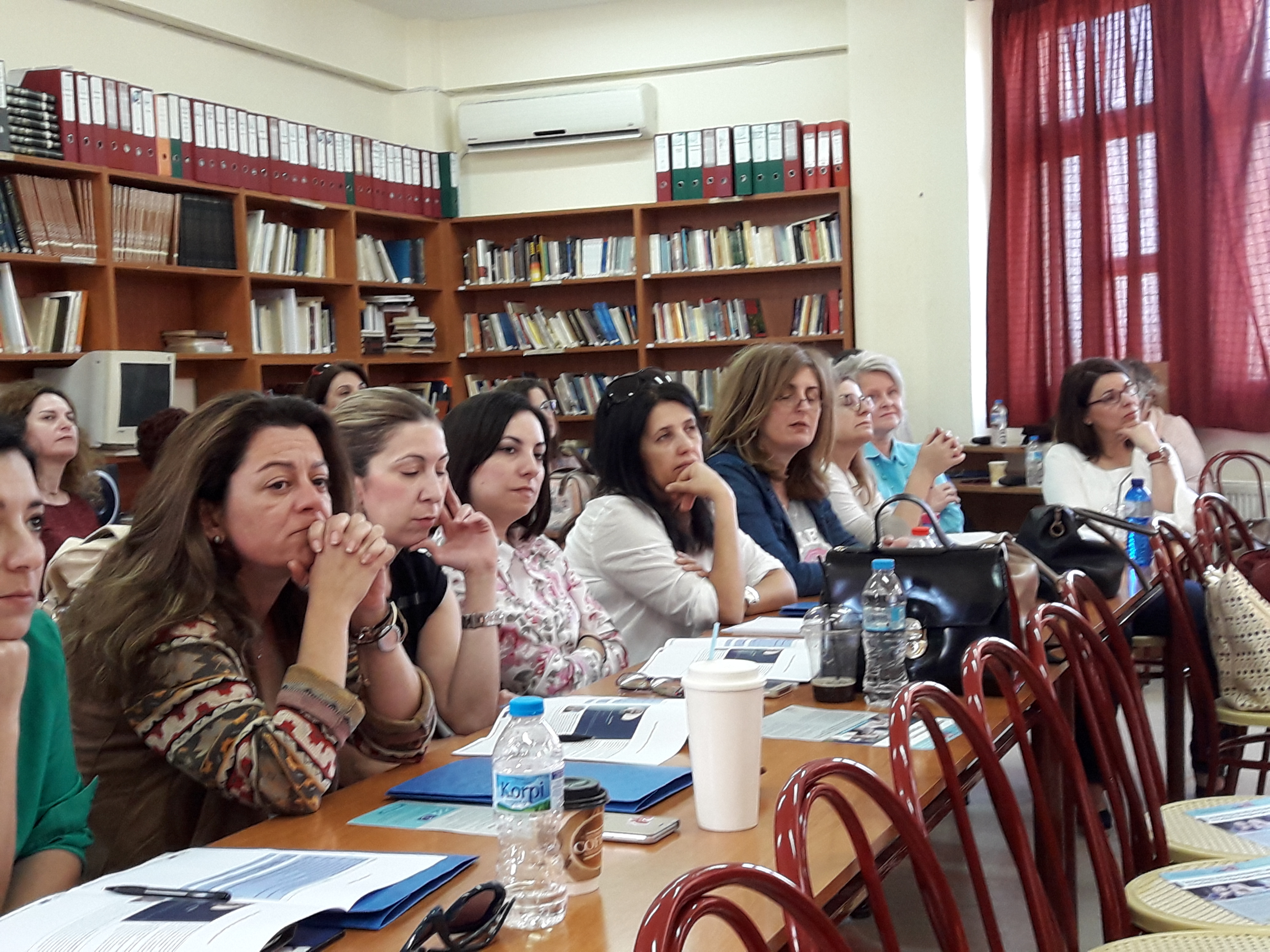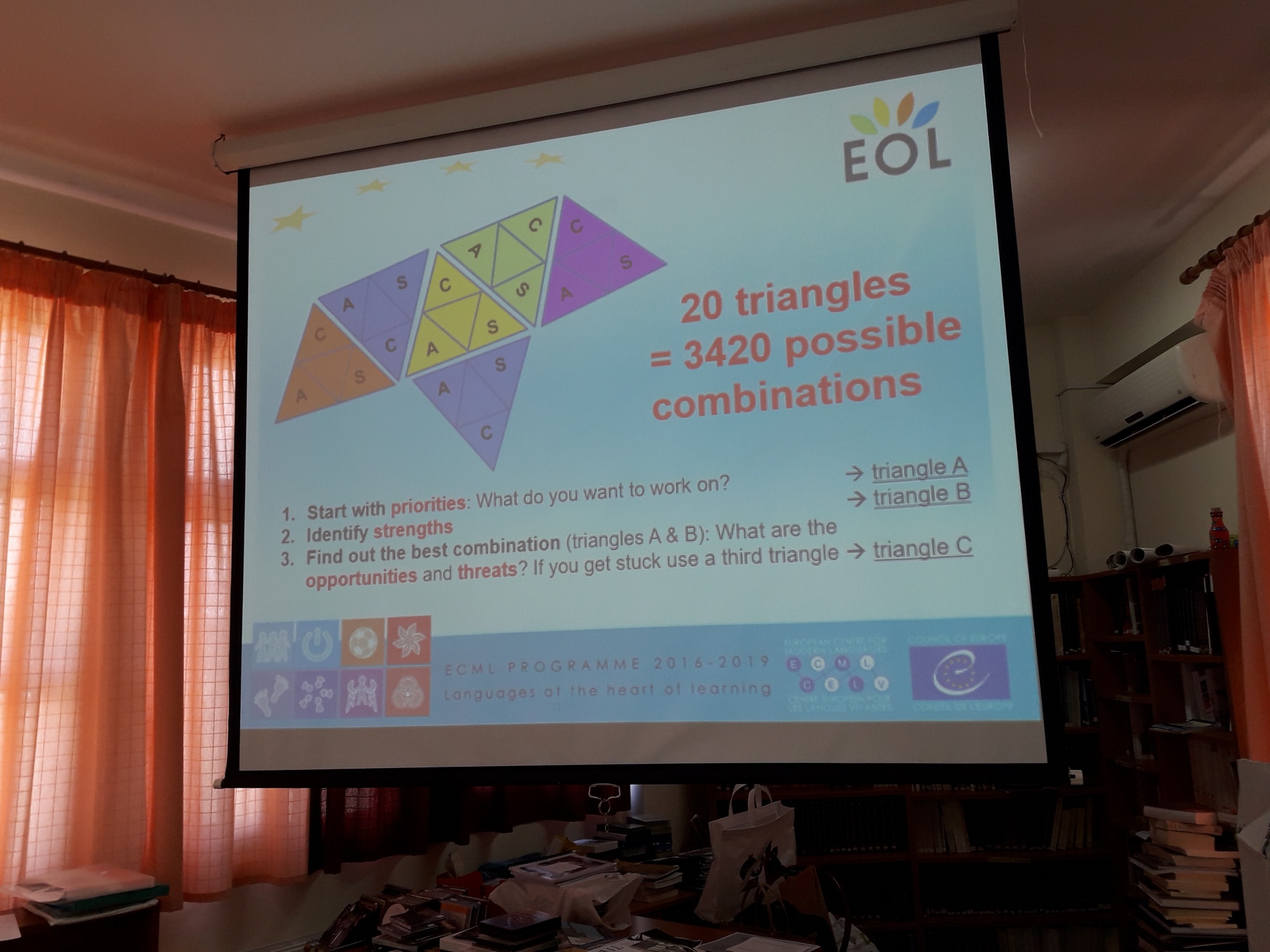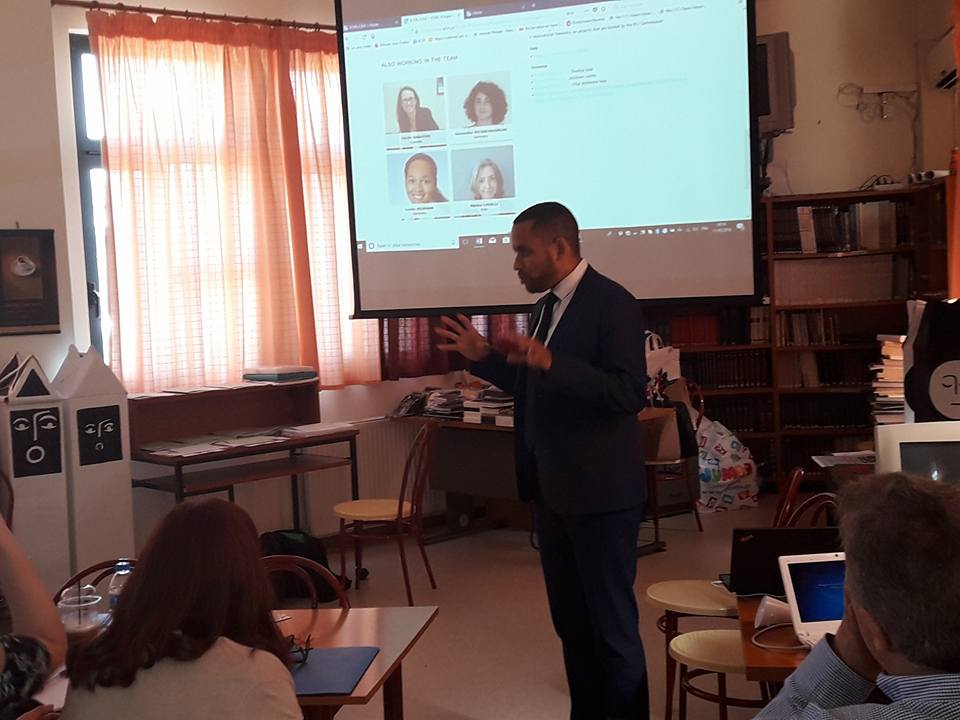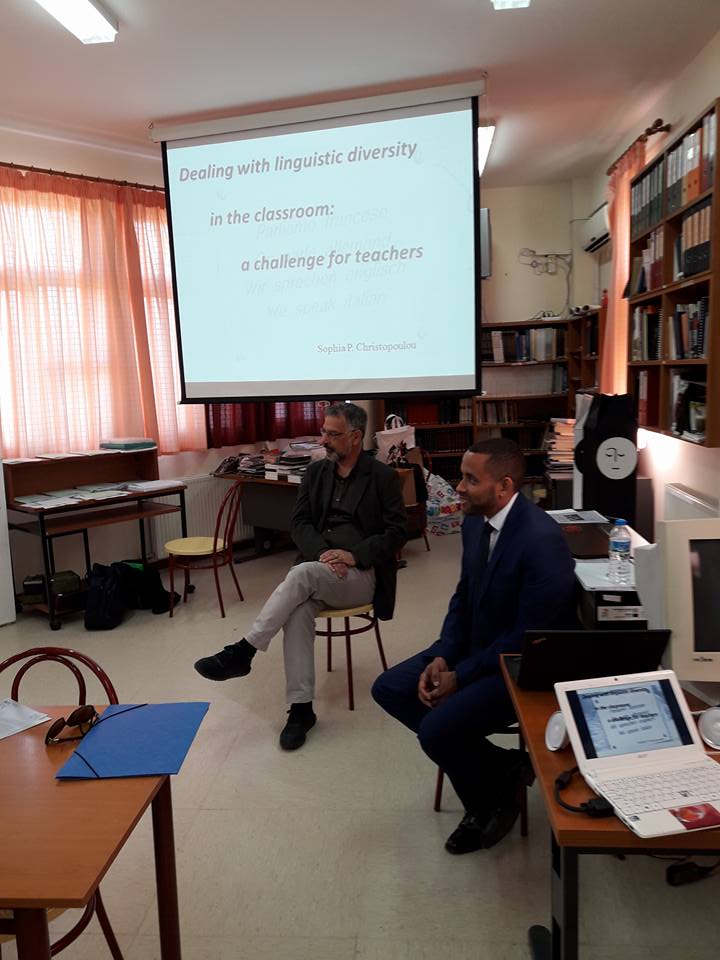The Greek Ministry for Education and Religious Affairs requested the expertise of the European Centre for Modern Languages (ECML) to support the implementation of important changes in policy and practice in language education, as it moves towards a more holistic approach which responds to constantly evolving needs of both learners and teachers. The current political and social context of migration together with the impact of electronic communication have resulted in increased linguistic and cultural diversity in Greek classrooms.
Organised by the Regional Directorate for Primary and Secondary Education in Western Greece and held in the music school of Agrinio, the conference included three other short presentations and a workshop which brought together 37 professionals: 25 teachers, 5 headmasters, 5 school advisors, Mr BARIS (Head of Scientific and Pedagogical Guidance for Primary Education at the Regional Directorate of Education in Western Greece) and Mr GIANNOPOULOS (Regional Director for Primary and Secondary Education in Western Greece).
The event was perfectly organised and coordinated by Ms Olympia TSOLOU.
The request to the ECML goes even further in order:
- “to replace present models which have been developed on the basis of a monolingual ethos of communication and monolingual pedagogical practices, serving ideologies of linguistic and cultural hegemony;
- to foster the development of alternative pedagogic discourses and practices for the teaching and learning of languages aiming at the interlinguistic and intercultural communication competences of European citizens;
- to ensure that all involved in the programme appreciate their responsibility for providing their students with opportunities to learn a variety of languages, and also for providing opportunities for alternative education and training of language-teaching instructors;
- to provide foreign language education for students in primary and secondary schools an education that must be linked with the teaching of their own mother tongue through a critical model of multilingual literacy”.
The systemic nature of the EOL project Learning Environments where modern languages flourish aligns well with the complexity of these issues.
EOL offers a global approach to language matters by considering how objectives for modern languages relate to concerns about the language(s) of schooling and the linguistic components in all curriculum subjects.
EOL proposes a transversal vision and a symbiotic approach to learning languages, teaching languages and teaching content by integrating languages and to managing schools and developing school systems.
This is the reason why the ECML proposed Jonas Erin, project coordinator of EOL, to support the Greek authorities. Jonas’ input at this event also gave him a great opportunity to test tools and resources that are still in development within the EOL project.
The preparation of the seminar was based on the participants’ answers to a questionnaire around their understanding of learning environments and current needs. The results highlighted great interest in the values of the Council of Europe, embodied in the work of the ECML. Moreover, three major issues emerged which show how important it is to develop a systemic approach to language education:
- An urgent social need:
How can foreign language learning become an efficient lever for social inclusion and advancement?
- The need for language learning pathways:
How can a culture of individualized language learning pathways be developed within the perspective of democratic citizenship?
- An issue of professional development:
What contribution can modern languages and European cooperation in education make towards professional development?
These issues were then addressed at the conference via the following three themes:
1. The values underpinning the Council of Europe’s language education policy
The three founding pillars of the Council of Europe - democracy, human rights and rule of law - set the scene for reflection on the specific role of language education and converged in the welcoming message of the Greek authorities on European integration, the video presentation on the Council’s values and the ECML’s activities by Sarah Breslin, Executive Director of the ECML and Jonas ERIN’s keynote - How to strengthen synergies between practice, research and policy?. The presentation of different resources and projects of the ECML helped to give a practical illustration of how language education contributes to these values.
2. Research in the field of plurilingualism
The presentation of research elements in the field of language acquisition was well appreciated: Ms CHRISTOPOULOU spoke about linguistic diversity and plurilingualism, Mr Erin about the factorial model of language acquisition theories (“How to stop the drift away of practice, research and policy”) and Ms TSOLOU concluded on translanguaging.
3. The professional development of actors and structures
Supporting changes in practice and policy by emphasizing plurilingual and intercultural education was at the heart of the seminar: making teachers and head teachers more conscious of the importance of global language awareness (keynote), developing collaborative approaches (workshop), presenting multimodal approaches (presentation of Ms KOTADAKI on Digital Storytelling).
The quest for coherence and convergence when planning language learning pathways was the baseline of the diverse contributions to this seminar.
Participants actively challenged their notions of learning environments, shared ideas and developed new strategies by linking personal, cultural and structural aspects.
Beyond the scientific and conceptual input, the following tools and resources were used and/or presented:
|
Resources of the EOL project
|
Other resources and projects
|
- The EOL matrix (EOL-E-10)
- The TrEOL tool (EOL-E-25)
- The matrix questions
- The memos (EOL-E-25)
- The profiling test (EOL-E-25)
- The action plan (EOL-E-13)
- The implementation strategies (EOL-E-26)
- Examples of projects (EOL-E-27)
|
|
The impact and global reach of the ECML
The participants’ feedback was positive:
- The numerous questions on how to contribute to the ECML activities (in workshops or as project member) reveal a great interest in the ECML in general;
- The will of many participants to register on the EOL working platform and to join the network of partner schools is a very encouraging;
- The requests for bilateral cooperation between the Greek and the French school system illustrates the indirect mediation function of the ECML.
The TrEOL tool and its symbiotic approach to language matters were particularly well appreciated. The participants set up alternative strategies to implement a global approach to language education and identified opportunities for transversal cooperation and cross-subject synergies.
Finally Ms TSOLOU’s excellent organisation of the seminar and the amazing welcome shown to the ECML expert, Jonas Erin, are worthy of mention. The hospitality, the value given to the ECML in the introductory words of the Greek authorities (T. BARIS and Κ. GIANNOPOULOS), the strong commitment of school advisors and teachers to a common European education policy are evidence of profound support for the ECML’s work and for the Council of Europe’s values. The excellent example of the Greek welcoming culture should be incorporated into the final proposals of the EOL project, particularly in relation to the impact of incoming mobility on creating learning environments where modern languages flourish.
Programme of the seminar
ECML project website "EOL - Learning environments where modern languages flourish": English - French - German
Photo impressions of the seminar
